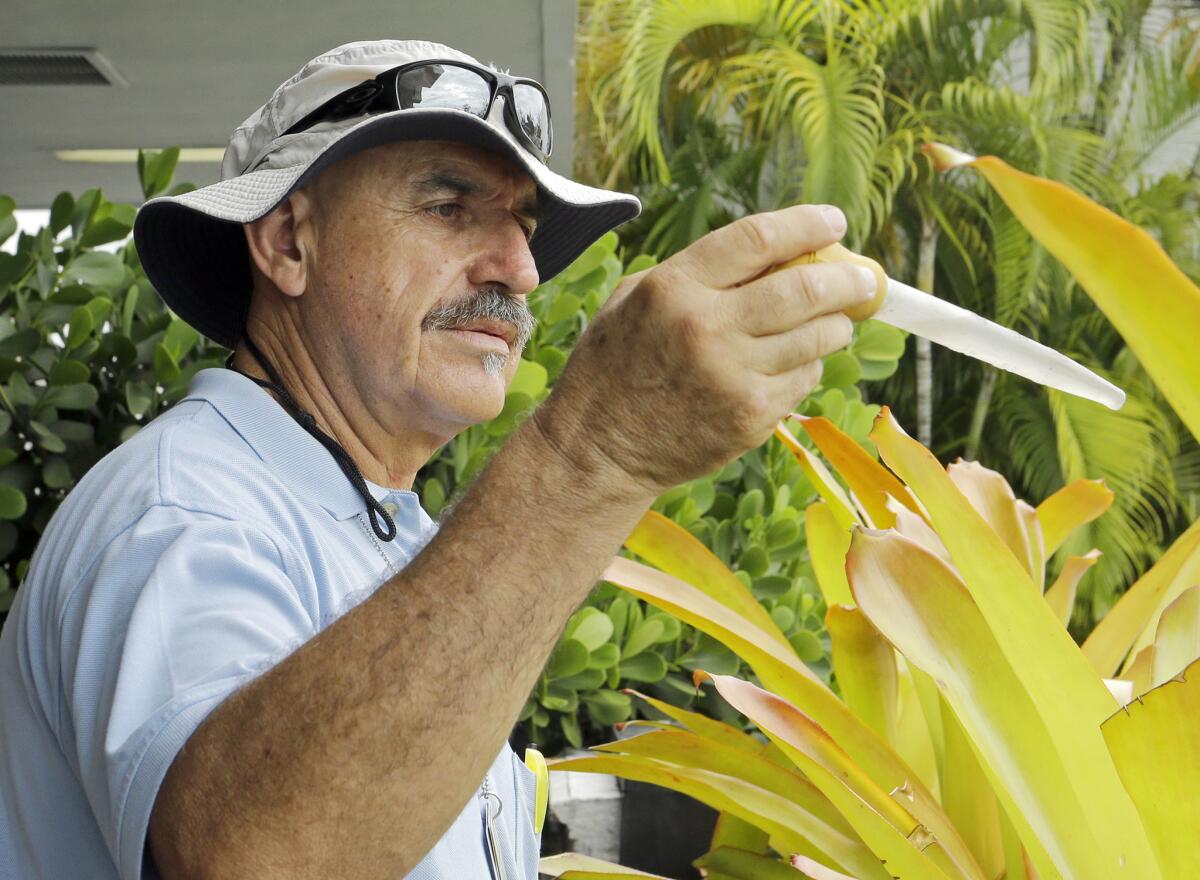With $1.1 billion in new funding, U.S. health officials outline plan for fighting Zika

- Share via
The nation’s top health officials on Monday laid out their plans for spending $1.1 billion in newly appropriated federal funds to combat the threat posed by the Zika virus.
At the same time, they vented frustration at Congress for taking so long to make the money available as the virus spread to more than 25,000 people in U.S. states and territories, including 3,600 on the mainland.
“We’ll move the money as fast as government procedures allow,” said Dr. Tom Frieden, director of the Centers for Disease Control and Prevention. Much of the funding would be spent over the next three months, he added.
To date, as many as 2,300 pregnant women have contracted the virus during their pregnancies, the officials said. And 22 babies in the United States and its territories have been born with microcephaly and other birth defects after they were exposed during gestation to Zika.
Frieden said the latest funding would allow the government to pay for long-term studies on how the virus affects exposed babies, including those with no obvious birth defects, after they are born. Already underway is Colombia-based study that will track 1,000 pregnant women and the babies they bear, he said.
“There’s a lot we still don’t know about the long-term problems” caused by a pregnant woman’s Zika infection, said Frieden.
“The biggest unknown in terms of the epidemiology is what will become of the infants born to mothers who don’t have microcephaly at birth,” Frieden said Monday. He said that in addition to causing brain abnormalities and raising the risk of stillbirth and of death within 24 hours of birth, Zika may have a range of subtler effects that aren’t immediately evident.
The officials’ comments came days after the House and Senate approved $1.1 billion in funds to fight Zika. That sum was far less than the $1.9 billion sought by the Obama administration in February, and came months after officials said they had hoped to launch a raft of initiatives that might have delayed the virus’ arrival in the United States or blunted its effect.
Saying that some projects could not wait, the Department of Health and Human Services several months ago switched hundreds of millions of dollars from existing programs to combat malaria, tuberculosis and Ebola virus to the fight against Zika.
The borrowed funds jump-started development of nine separate vaccine candidates, diagnostic tests to detect Zika infection quickly and mosquito-control campaigns in Puerto Rico and several southern states. But only after Zika came ashore on the U.S. mainland, in the Wynwood and Miami-Dade areas of Florida, did Congress act.
Had funding materialized earlier, scientists said they would be closer to producing a vaccine to protect women of child-bearing age and the men they have sex with. Given Congress’ delay, some vaccine manufacturers saw fit to “walk away from negotiations with us because they weren’t sure if the money was going to be there,” said Nicole Lurie, assistant HHS secretary for preparedness and response.
“We are behind where we should be on vaccine development and diagnostic test development,” Lurie added.
Calling the Zika threat “too great” for further delay, Health and Human Services Secretary Sylvia Burwell said, “We redirected and transferred money from other priorities” to start the design of vaccine candidates, build monitoring and laboratory capacity to detect Zika’s spread, and control mosquitoes, which spread the disease, in states and territories where they circulate.
Dr. Anthony Fauci, director of the National Institute of Allergy and Infectious Diseases, reported that five vaccine candidates, each trying a different approach to boosting immunity to Zika, are moving toward safety testing in humans. The first, a genetically engineered vaccine developed by NIH researchers, has just completed recruitment for an early trial of its safety and will start soon, he said.
Four more vaccine candidates are under development under contracts with the Biomedical Advanced Research and Development Authority, an office within HHS that oversees vaccine policy. With nine vaccine candidates, said Lurie, officials are confident at least one will emerge as safe and effective for widespread use.
But conducting that work on borrowed money was not without cost, Fauci said.
“The money that Secretary Burwell gave us from the other institutes, namely cancer, heart disease, diabetes and mental health, none of that money is going to come back,” Fauci said Monday.
The officials said the funding delay shows why it’s important for the country to have an emergency fund in place so that health officials can respond more quickly when threats like Zika emerge.
Follow me on Twitter @LATMelissaHealy and “like” Los Angeles Times Science & Health on Facebook.
MORE IN SCIENCE
Japanese scientist Yoshinori Ohsumi wins Nobel Prize in medicine for work on cellular ‘recycling’
Bees buzzing on sugar can experience emotions like happiness and optimism, scientists say
It’s official: Rosetta’s long journey with comet 67P has ended




